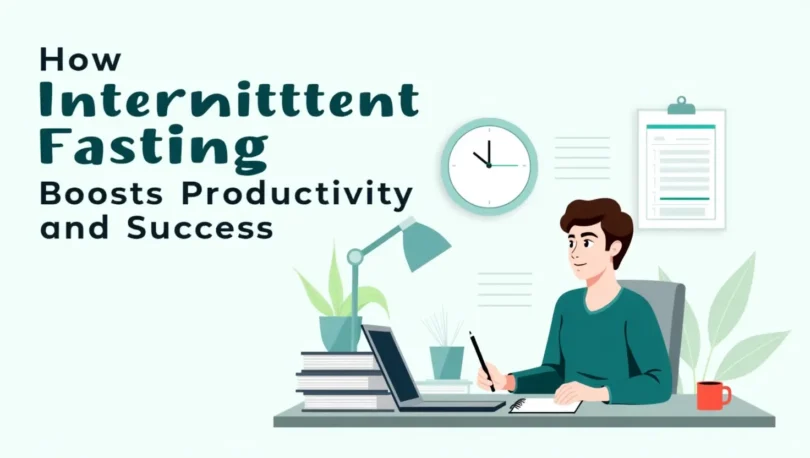In today’s fast-paced world, staying productive and maintaining mental clarity are essential for success. But what if the key to unlocking peak performance wasn’t another cup of coffee or a new time-management hack, but rather when you eat? Intermittent fasting (IF) has gained immense popularity—not just as a weight loss strategy, but as a powerful tool for enhancing focus, energy levels, and overall productivity.
By strategically cycling between periods of eating and fasting, IF helps regulate insulin sensitivity, cortisol levels, and brain function, leading to better concentration, improved decision-making, and sustained energy throughout the day. High-achievers, entrepreneurs, and professionals worldwide have embraced IF as a simple yet effective way to boost productivity and achieve success.
In this article, we’ll explore the science behind intermittent fasting, its impact on cognitive function and energy levels, and how you can implement fasting strategies to enhance your work performance and personal growth. Ready to supercharge your productivity? Let’s dive in! 🚀
Headlines
The Science Behind Intermittent Fasting and Productivity
- How Fasting Affects Brain Function and Focus
- The Impact of Fasting on Energy Levels and Mental Clarity
Best Intermittent Fasting Strategies for Maximum Productivity
How Intermittent Fasting Transforms Productivity and Success
- Fasting as a Productivity Hack for High Achievers
- Overcoming Common Challenges and Staying Consistent
The Science Behind Intermittent Fasting and Productivity
How Fasting Affects Brain Function and Focus
Intermittent fasting (IF) does more than just help with weight loss—it has a profound impact on brain function, mental clarity, and focus. When you fast, your body undergoes several metabolic changes that optimize cognitive performance, enhance memory, and even support long-term brain health. Let’s explore the science behind how fasting sharpens your mind.
1. Autophagy: The Brain’s Natural Detox Process
One of the most powerful benefits of fasting is a process called autophagy, which is the body’s way of cleaning out damaged cells and regenerating new, healthy ones. In the brain, autophagy helps:
- Remove cellular waste that can contribute to mental fog and neurodegenerative diseases.
- Enhance neural connections, improving learning and memory.
- Boost cognitive resilience, making the brain more resistant to stress and aging.
By regularly engaging in fasting, you’re essentially giving your brain a deep cleanse, allowing it to function more efficiently.
2. Increased Production of Brain-Derived Neurotrophic Factor (BDNF)
BDNF is a protein often referred to as “fertilizer for the brain” because it supports:
- Growth and maintenance of neurons, essential for learning and memory.
- Neuroplasticity, which helps the brain adapt to new information and challenges.
- Protection against neurodegenerative diseases like Alzheimer’s and Parkinson’s.
Studies show that fasting can significantly increase BDNF levels, leading to improved focus, faster learning, and better problem-solving abilities.
3. Enhanced Dopamine and Serotonin Levels for Motivation and Mood
Fasting plays a role in regulating neurotransmitters such as dopamine and serotonin, which are crucial for motivation, concentration, and emotional balance.
- Dopamine: The “motivation molecule” that enhances focus, drive, and goal-oriented behavior. Fasting has been shown to increase dopamine sensitivity, making everyday tasks feel more rewarding.
- Serotonin: Known as the “happiness hormone,” serotonin helps regulate mood and emotional stability, reducing stress and anxiety.
By keeping these neurotransmitters in balance, fasting creates the ideal mental state for productivity and success.
4. Stable Energy Levels and Reduced Brain Fog
One of the biggest productivity killers is the energy crash caused by fluctuating blood sugar levels. When you follow a typical eating pattern with frequent meals and snacks, your body relies on glucose for energy, leading to spikes and crashes in blood sugar. These fluctuations often result in:
- Brain fog
- Midday fatigue
- Reduced concentration
During fasting, your body shifts from using glucose to burning fat for fuel, a state known as ketosis. This process produces ketones, which are a more efficient and stable energy source for the brain. The result?
- Sustained mental clarity
- Improved focus
- More consistent energy throughout the day
This is why many entrepreneurs, CEOs, and high performers practice intermittent fasting—they experience fewer distractions, higher efficiency, and better decision-making abilities.
5. Lower Cortisol and Reduced Stress for Optimal Performance
Cortisol, the body’s primary stress hormone, is responsible for managing stress and alertness. While short-term fasting can slightly elevate cortisol to keep you alert and energized, long-term fasting helps balance cortisol levels, reducing the negative effects of chronic stress, such as:
- Mental burnout
- Irritability and mood swings
- Difficulty concentrating
By managing cortisol levels, fasting helps create a calm but focused state of mind, making it easier to stay productive and achieve long-term success.
Final Thoughts
Intermittent fasting is more than just a dietary trend—it’s a powerful brain-boosting tool that enhances focus, mental clarity, and cognitive performance. By promoting autophagy, increasing BDNF, balancing neurotransmitters, stabilizing energy levels, and managing stress, fasting allows you to unlock your full mental potential.
The Impact of Fasting on Energy Levels and Mental Clarity
One of the biggest challenges in maintaining productivity throughout the day is energy fluctuations and brain fog. Many people experience afternoon crashes, sluggishness, and an overall lack of mental clarity, which affects focus and efficiency. Intermittent fasting (IF) has been shown to optimize energy levels and cognitive function, making it a powerful tool for those looking to enhance their productivity and success.
Let’s explore how fasting impacts energy metabolism, mental sharpness, and long-term brain health.
1. Shift from Glucose to Ketones: A More Efficient Fuel for the Brain
When we eat frequently, our body relies on glucose (sugar) as its primary source of energy. While glucose provides a quick energy boost, it also leads to spikes and crashes in blood sugar levels, causing:
- Midday fatigue
- Brain fog
- Dips in concentration
During fasting, the body switches from burning glucose to using stored fat for energy, a process known as ketosis. In ketosis, the liver converts fats into ketones, which serve as a highly efficient fuel source for the brain.
Why Ketones Are Better for Mental Clarity and Energy
- More stable energy levels: Unlike glucose, ketones provide a steady supply of energy without spikes or crashes.
- Improved mental focus: Ketones enhance neurotransmitter function, supporting learning, memory, and problem-solving.
- Increased mitochondrial efficiency: Mitochondria are the energy factories of cells, and ketones help them produce energy more efficiently.
Many individuals who practice intermittent fasting report feeling more alert, focused, and mentally sharp, especially in the morning and early afternoon.
2. Increased Insulin Sensitivity for Sustained Energy
Insulin is a hormone that helps regulate blood sugar levels. When insulin levels are too high, it can lead to fatigue, sugar cravings, and energy crashes.
Fasting improves insulin sensitivity, meaning the body becomes more efficient at processing food for energy. Benefits include:
- More consistent energy levels throughout the day
- Reduced sugar cravings that lead to crashes
- Better regulation of appetite and mood
By stabilizing insulin and blood sugar, fasting prevents energy dips and helps maintain a clear and focused mind for longer periods.
3. Regulation of Cortisol: Reducing Stress and Enhancing Alertness
Cortisol, often called the stress hormone, plays a significant role in energy regulation. While too much cortisol can lead to anxiety, burnout, and brain fog, fasting helps maintain optimal cortisol levels, ensuring:
- Increased alertness in the morning
- Lower stress and anxiety levels
- Better focus under pressure
Short-term fasting naturally increases cortisol to keep you alert and focused, but long-term fasting prevents excessive spikes that lead to chronic stress. This balance allows you to stay sharp, calm, and productive throughout the day.
4. Boosting Mitochondrial Health for Higher Energy Output
Mitochondria are the powerhouses of cells, responsible for producing ATP (energy). Over time, poor diet, lack of exercise, and oxidative stress can damage mitochondria, leading to low energy and fatigue.
- Fasting promotes mitochondrial biogenesis, which means:
- Your body creates new mitochondria, improving energy production.
- Damaged mitochondria get repaired through autophagy, reducing energy waste.
- Cells become more efficient at producing ATP, leading to higher endurance and mental clarity.
By strengthening mitochondrial function, fasting provides a long-term energy boost that enhances both physical and mental performance.
5. Balanced Neurotransmitters for Better Mood and Focus
Fasting affects key neurotransmitters, which play a crucial role in motivation, energy levels, and cognitive function.
Dopamine (The Motivation Chemical):
- Fasting increases dopamine sensitivity, making you feel more motivated and engaged.
- This leads to higher focus, faster decision-making, and enhanced creativity.
Serotonin (The Mood Stabilizer):
- Fasting reduces inflammation in the brain, leading to better emotional balance.
- This means less stress, fewer mood swings, and improved concentration.
Norepinephrine (The Alertness Hormone):
- Fasting triggers the release of norepinephrine, which keeps the brain in a high-alert state.
- This contributes to enhanced problem-solving skills, mental clarity, and better memory recall.
By naturally balancing these brain chemicals, fasting helps create the optimal mental state for productivity and success.
Final Thoughts
Intermittent fasting is a powerful tool for improving energy levels and mental clarity. By shifting from glucose to ketones, stabilizing insulin and cortisol levels, optimizing mitochondrial function, and balancing neurotransmitters, fasting provides a natural and sustainable energy boost.
Best Intermittent Fasting Strategies for Maximum Productivity
Choosing the Right Fasting Method for Your Lifestyle
Intermittent fasting (IF) is not a one-size-fits-all approach. The right fasting method depends on your schedule, goals, energy demands, and personal preferences. Whether you’re a busy professional, an entrepreneur, or someone looking to optimize productivity and success, choosing the right fasting protocol can maximize mental clarity, focus, and sustained energy levels.
Let’s explore the most popular fasting methods and how to pick the best one for your lifestyle.
1. The 16/8 Method: Best for Beginners and Busy Professionals
How It Works:
The 16/8 method involves fasting for 16 hours and eating within an 8-hour window each day. A common schedule is:
- Start fasting at 8:00 PM after dinner.
- Break your fast at 12:00 PM the next day with lunch.
Who It’s Best For:
- Busy professionals who don’t have time for breakfast.
- Beginners who want an easy-to-follow fasting plan.
- Entrepreneurs looking for sustained focus and productivity during the morning hours.
Key Benefits:
- Enhances focus and mental clarity in the morning.
- Easy to integrate into daily routines (skip breakfast, eat lunch & dinner).
- Supports weight management and energy regulation without drastic lifestyle changes.
🔹 Pro Tip: Drink water, black coffee, or herbal tea in the morning to stay energized and focused while fasting.
2. The OMAD (One Meal a Day) Method: Best for Maximum Productivity and Simplicity
How It Works:
With OMAD, you eat only one meal per day, typically within a 1-2 hour window. This means fasting for 22-23 hours and consuming all calories in a single sitting.
Who It’s Best For:
- High achievers and entrepreneurs who prefer a no-nonsense, distraction-free approach to eating.
- People with demanding work schedules who want to eliminate the need for multiple meals.
- Those comfortable with extended fasting and large, nutrient-dense meals.
Key Benefits:
- Eliminates decision fatigue (no need to plan multiple meals).
- Maximizes mental focus and sustained energy throughout the day.
- Boosts autophagy (cellular repair) and fat-burning efficiency.
🔹 Pro Tip: To prevent nutrient deficiencies, ensure your one meal is well-balanced, including protein, healthy fats, fiber, and micronutrients.
3. Alternate-Day Fasting (ADF): Best for Flexibility and Fat Loss
How It Works:
- You fast for a full 24 hours every other day.
- On eating days, you eat normally without calorie restrictions.
Who It’s Best For:
- People who want to maximize fat loss while maintaining productivity.
- Those who don’t want to fast every day but still want fasting benefits.
- Athletes or fitness enthusiasts looking to improve metabolism.
Key Benefits:
- Helps break through fat loss plateaus while maintaining muscle.
- Enhances cognitive function by giving the brain extended breaks from digestion.
- Improves metabolic flexibility, allowing the body to use both glucose and fat for fuel.
🔹 Pro Tip: Stay hydrated and consume electrolytes on fasting days to avoid fatigue.
4. The 5:2 Diet: Best for Balanced Lifestyle and Long-Term Sustainability
How It Works:
- Eat normally for 5 days a week.
- Reduce calorie intake to 500-600 calories for 2 non-consecutive days (e.g., Monday & Thursday).
Who It’s Best For:
- People who don’t want to fast every day but still want metabolic benefits.
- Those with social commitments or variable work schedules.
- Beginners who want a gradual approach to fasting.
Key Benefits:
- Flexible and easy to maintain long-term.
- Doesn’t require strict daily fasting while still offering cognitive and metabolic benefits.
- Great for individuals transitioning into fasting without a drastic change in routine.
🔹 Pro Tip: Plan nutrient-dense, high-protein meals on fasting days to stay full and energized.
5. Time-Restricted Eating (TRE): Best for Aligning with the Body’s Natural Clock
How It Works:
Time-Restricted Eating (TRE) involves eating only during daylight hours, typically within a 10-12 hour window (e.g., 8 AM – 6 PM). This method aligns with the circadian rhythm, optimizing metabolism and digestion.
Who It’s Best For:
- People who prefer earlier meals and don’t like skipping breakfast.
- Those with traditional work schedules who want a simple fasting routine.
- Anyone looking to improve gut health and sleep quality.
Key Benefits:
- Supports natural hormonal balance by eating in sync with daylight.
- Improves digestion and sleep quality.
- Enhances energy and cognitive performance during the day.
🔹 Pro Tip: Avoid late-night eating to maximize metabolic and cognitive benefits.
How to Choose the Right Fasting Method for Your Lifestyle
| Fasting Method | Best For | Eating Window | Fasting Duration |
|---|---|---|---|
| 16/8 Method | Beginners, busy professionals | 8 hours | 16 hours |
| OMAD (One Meal a Day) | Entrepreneurs, high achievers | 1-2 hours | 22-23 hours |
| Alternate-Day Fasting (ADF) | Fat loss, metabolic flexibility | Normal eating days | 24-hour fasts every other day |
| 5:2 Diet | Balanced lifestyle, social eaters | Normal for 5 days, low-calorie for 2 days | 500-600 calories on fasting days |
| Time-Restricted Eating (TRE) | People who prefer earlier meals, gut health | 10-12 hours | 12-14 hours |
Final Thoughts: Finding Your Perfect Fasting Plan
Choosing the right intermittent fasting method depends on your personal goals, lifestyle, and daily routine. Whether you prefer short daily fasts (16/8), a single daily meal (OMAD), or longer fasts for flexibility (ADF, 5:2), each approach offers unique cognitive and productivity benefits.
To get started, pick a method that aligns with your schedule, experiment, and listen to your body. Once you find the right fasting style, you’ll experience enhanced focus, sustained energy, and improved overall performance—leading to greater productivity and success.
🔹 Ready to try intermittent fasting? Start small, stay consistent, and unlock your peak performance! 🚀
How to Optimize Your Eating Window for Success
Intermittent fasting (IF) is not just about when you fast—it’s also about how you strategically use your eating window to maximize energy, mental clarity, and productivity. If you don’t fuel your body properly during the eating period, you might experience fatigue, brain fog, or hunger, which can impact your overall success.
To truly benefit from fasting, you need to structure your meals intelligently—choosing the right foods, balancing macronutrients, and syncing your eating window with your lifestyle. Here’s how to optimize your eating window for peak performance.
1. Choosing the Right Eating Window for Maximum Productivity
Your eating window should align with your energy demands, work schedule, and lifestyle preferences.
Popular Eating Windows & Who They Work Best For
12 PM – 8 PM (16/8 Method) → Best for Busy Professionals
- Skip breakfast, eat lunch and dinner.
- Ideal for those who feel most productive in the morning and prefer to eat later.
10 AM – 6 PM (Time-Restricted Eating) → Best for Early Risers
- First meal mid-morning, last meal early evening.
- Works well for those who prefer eating earlier and sleeping with an empty stomach.
1 PM – 9 PM (Flexible Window) → Best for Social Eaters
- Allows for a later dinner while still fasting in the morning.
- Great for those who want to enjoy meals with family or colleagues.
🔹 Pro Tip:
- Morning productivity boost? Choose a later eating window (e.g., 12 PM – 8 PM).
- Prefer early meals? Start eating earlier (e.g., 10 AM – 6 PM).
- Dinner meetings & social life important? Opt for an evening window (e.g., 1 PM – 9 PM).
2. Prioritizing Nutrient-Dense Foods for Sustained Energy
When breaking a fast, what you eat is just as important as when you eat. Poor food choices can lead to energy crashes, cravings, and reduced focus.
Key Nutrients to Include:
Protein: Supports muscle growth, satiety, and sustained energy.
- Best Sources: Eggs, chicken, fish, grass-fed beef, tofu, legumes.
Healthy Fats: Provides long-lasting energy and supports brain function.
- Best Sources: Avocados, nuts, seeds, olive oil, fatty fish.
Fiber & Complex Carbs: Helps maintain steady blood sugar levels and supports digestion.
- Best Sources: Leafy greens, quinoa, brown rice, sweet potatoes, berries.
Electrolytes & Hydration: Prevents dehydration and supports cognitive performance.
- Best Sources: Water, coconut water, bone broth, Himalayan salt, magnesium-rich foods.
🔹 Pro Tip: Start your first meal with a balance of protein, healthy fats, and fiber to prevent insulin spikes and keep your energy stable.
3. Avoiding Common Mistakes That Sabotage Productivity
Even with the right eating window, certain habits can reduce the effectiveness of fasting and negatively impact your focus.
Mistakes to Avoid & Their Solutions:
🚫 Overeating Processed Carbs → Leads to Energy Crashes
✅ Solution: Focus on whole foods, fiber, and protein to maintain stable blood sugar.
🚫 Breaking the Fast with Sugary Foods → Triggers Hunger & Brain Fog
✅ Solution: Start with protein and healthy fats (e.g., eggs & avocado instead of pastries).
🚫 Eating Too Little → Causes Fatigue & Lack of Focus
✅ Solution: Ensure you’re meeting your calorie needs within your eating window.
🚫 Not Hydrating Properly → Leads to Dehydration & Low Energy
✅ Solution: Drink water, herbal teas, or electrolyte-infused drinks throughout the day.
4. Timing Your Meals for Maximum Energy & Focus
The timing of your meals can make a huge difference in how you feel throughout the day.
Meal Timing Tips for Productivity:
- First Meal: Start with a protein-rich meal to stabilize blood sugar and enhance focus.
- Mid-Day Meal (If Needed): Opt for nutrient-dense foods that sustain energy (avoid heavy, high-carb meals).
- Last Meal: Keep it balanced but light enough to avoid sluggishness before bed.
🔹 Pro Tip: Front-load protein in your eating window—this helps maintain muscle mass, curb hunger, and sustain mental clarity.
5. Optimizing Your Evening Meal for Rest & Recovery
Your last meal of the day impacts sleep quality, recovery, and next-day productivity. Eating too late or consuming the wrong foods can disrupt sleep, leading to poor focus and fatigue the next day.
Best Practices for Your Last Meal:
- Eat at least 2-3 hours before bed to improve digestion and sleep.
- Include magnesium-rich foods (leafy greens, nuts, dark chocolate) to relax the body.
- Avoid high-sugar foods & caffeine in the evening to prevent sleep disturbances.
🔹 Pro Tip: Want deeper sleep? Try a light dinner with healthy fats and protein instead of a carb-heavy meal.
Final Thoughts: Structuring Your Eating Window for Success
Optimizing your eating window is key to sustaining high energy, mental clarity, and peak performance. By choosing the right fasting schedule, eating nutrient-dense foods, avoiding common mistakes, timing meals strategically, and prioritizing recovery, you can ensure intermittent fasting enhances—not hinders—your productivity and success.
How Intermittent Fasting Transforms Productivity and Success
Fasting as a Productivity Hack for High Achievers
In today’s fast-paced world, high achievers—entrepreneurs, executives, and creatives—are constantly looking for ways to maximize their focus, energy, and efficiency. While productivity hacks like time-blocking, deep work, and meditation are well-known, intermittent fasting (IF) has emerged as a powerful tool that enhances mental clarity, decision-making, and sustained energy.
Fasting isn’t just about skipping meals—it’s about optimizing brain function, reducing distractions, and harnessing metabolic efficiency to operate at peak performance. Here’s why intermittent fasting is a game-changing productivity hack for those who strive for excellence.
1. Eliminating Decision Fatigue & Enhancing Focus
High achievers often deal with decision fatigue—the mental exhaustion that comes from making too many choices throughout the day. From deciding what to wear to what to eat, every small decision drains cognitive resources.
How Fasting Helps:
- Removes unnecessary meal decisions → More mental energy for important tasks.
- Eliminates mid-day energy crashes → Allows for deep, uninterrupted focus.
- Frees up morning time → No need to prepare or eat breakfast, giving extra time for productive work.
🔹 Pro Tip: Many successful individuals, including Steve Jobs and Jeff Bezos, simplify their routines to reduce decision fatigue—fasting takes this concept even further by eliminating food-related distractions in the morning.
2. Boosting Brain Function & Cognitive Performance
Fasting has been scientifically linked to improved brain function, memory, and focus. When you fast, your body shifts into a ketogenic state, where it burns fat for energy instead of glucose. This metabolic shift enhances mental clarity and helps the brain function more efficiently.
Cognitive Benefits of Fasting for High Achievers:
- Increases production of BDNF (Brain-Derived Neurotrophic Factor): Supports memory, learning, and cognitive resilience.
- Reduces brain fog: Helps maintain a sharp, clear mind throughout the day.
- Improves problem-solving & creativity: With fewer glucose fluctuations, the brain can operate more effectively.
🔹 Pro Tip: Many entrepreneurs report their most productive, creative work happens during the fasting state—especially in the morning before their first meal.
3. Sustained Energy Without Mid-Day Crashes
One of the biggest productivity killers is the afternoon slump—that post-lunch drowsiness that makes it hard to concentrate. High achievers need consistent energy levels to maintain productivity all day long.
Why Fasting Prevents Energy Crashes:
🚫 No blood sugar spikes & crashes → Stable energy levels throughout the day.
🚫 No heavy meals to slow digestion → Avoids sluggishness and brain fog.
✅ Body efficiently burns fat for fuel → Provides steady, long-lasting energy.
🔹 Pro Tip: Pair fasting with hydration (water, electrolytes, black coffee, or green tea) to stay energized and mentally sharp.
4. Saving Time & Increasing Work Efficiency
For high achievers, time is money. Traditional eating schedules involve meal preparation, eating, and digestion time—taking up valuable hours in a day.
How Fasting Saves Time for Productivity:
- No breakfast = More time for deep work.
- Fewer meals = Less time spent cooking, eating, and cleaning.
- Meal simplicity = Reduced stress around food choices.
🔹 Pro Tip: Many successful people, including Twitter’s Jack Dorsey, swear by fasting for maximizing work hours and mental clarity.
5. Sharpening Discipline & Mental Toughness
High achievers thrive on self-discipline and mental resilience—and fasting is one of the best ways to strengthen both.
How Fasting Builds Mental Toughness:
- Teaches self-control → Overcoming hunger teaches discipline.
- Strengthens willpower → Helps in resisting distractions and staying focused on goals.
- Enhances patience & endurance → Builds resilience for high-pressure situations.
🔹 Pro Tip: Fasting forces you to delay gratification—a skill essential for long-term success in business, leadership, and personal growth.
6. Improving Sleep & Recovery for Peak Performance
Quality sleep is critical for high performers, and fasting can positively impact sleep quality by optimizing digestion and hormone balance.
How Fasting Supports Better Sleep:
- Regulates circadian rhythm → Eating earlier in the day helps align the body’s internal clock.
- Reduces late-night eating → Prevents disrupted sleep due to digestion.
- Balances hormones like melatonin & cortisol → Improves deep sleep and next-day focus.
🔹 Pro Tip: Try ending your eating window 3 hours before bed to experience deeper, more restorative sleep.
7. Fasting as a Long-Term Strategy for Success
The greatest benefit of fasting is its sustainability—it’s not just a short-term hack but a long-term lifestyle shift that helps high achievers optimize their bodies and minds for peak performance.
Why High Achievers Stick to Fasting:
- Enhances focus & cognitive function for better decision-making.
- Saves time & reduces distractions for deep work.
- Strengthens discipline & resilience—key traits for success.
- Supports long-term health & longevity—so you can achieve more for longer.
🔹 Pro Tip: View fasting not as a diet, but as a productivity strategy that supports your career, business, and personal growth.
Final Thoughts: Unlocking Peak Productivity Through Fasting
For high achievers, time, energy, and mental performance are the most valuable resources. Intermittent fasting is more than a diet—it’s a powerful productivity tool that helps streamline decision-making, eliminate distractions, enhance focus, and sustain energy levels.
If you’re looking to optimize your performance, experiment with fasting and see how it transforms your clarity, efficiency, and success.
Overcoming Common Challenges and Staying Consistent
Intermittent fasting (IF) offers numerous benefits, from enhanced productivity to improved mental clarity and sustained energy. However, like any lifestyle change, it comes with challenges—especially in the beginning. Many people struggle with hunger, social situations, energy dips, or simply staying consistent with their fasting routine.
The key to success is understanding these obstacles and developing strategies to overcome them. Here’s how to tackle the most common fasting challenges and build a sustainable, long-term habit.
1. Managing Hunger and Cravings
One of the biggest hurdles for beginners is dealing with hunger, especially during the early days of fasting. The good news? Hunger is often temporary and decreases as your body adapts.
Why Hunger Happens:
- Your body is used to a regular eating schedule and produces ghrelin (the hunger hormone) at those times.
- Poor food choices in your eating window (such as high-sugar or processed foods) can cause cravings.
- Dehydration can mimic hunger, leading to unnecessary snacking.
How to Reduce Hunger & Cravings:
- Stay Hydrated: Drink plenty of water, herbal tea, or black coffee to curb hunger.
- Eat High-Protein, High-Fiber Meals: These keep you fuller for longer.
- Increase Healthy Fats: Avocados, nuts, and olive oil help control appetite.
- Keep Busy: Engage in work, exercise, or a hobby to distract yourself from cravings.
🔹 Pro Tip: If you feel extreme hunger, remind yourself that hunger comes in waves and typically fades after 10-15 minutes. Drinking water or tea can help you push through.
2. Dealing with Low Energy and Fatigue
Feeling low on energy when starting IF is common, but it’s temporary as your body transitions from burning glucose to burning fat for energy.
Why Fatigue Happens:
- Your body is adjusting to using stored fat as fuel.
- You might not be eating enough calories or nutrients in your eating window.
- You could be low on electrolytes (sodium, magnesium, potassium)—essential for energy production.
How to Maintain Energy Levels:
- Drink Electrolytes: Add Himalayan salt to water or consume electrolyte-rich foods.
- Prioritize Sleep: Poor sleep worsens fatigue—aim for 7-9 hours of quality rest.
- Break Your Fast with Nutrient-Dense Foods: Avoid processed carbs that lead to energy crashes.
- Give It Time: Most people adapt within 1-2 weeks, and energy levels improve.
🔹 Pro Tip: Feeling weak or dizzy? Try adding a pinch of salt to your water—it can make an immediate difference in energy levels.
3. Handling Social Situations and Peer Pressure
Social gatherings, family dinners, and work events can challenge your fasting schedule. People may question your eating habits, and avoiding peer pressure isn’t always easy.
How to Stay on Track in Social Situations:
- Plan Your Eating Window Around Events: Adjust your fasting schedule to fit social meals.
- Have a Go-To Response: If someone asks, simply say: “I’m just not hungry right now” or “I’m trying something new for my health.”
- Focus on Conversations, Not Food: Shift attention to socializing instead of eating.
- Bring Your Own Healthy Options: If it’s a potluck, bring a nutrient-rich dish that aligns with your goals.
🔹 Pro Tip: If you need to break your fast early for a special occasion, don’t stress—just get back on track the next day. Consistency over time matters more than perfection.
4. Breaking Through Weight Loss Plateaus
Many people start fasting and see initial progress, but after a while, they hit a plateau where weight loss slows or stops.
Why Weight Loss Can Stall:
- Your body adapts to your calorie intake and fasting schedule.
- You might be eating too much or too little during your eating window.
- Hidden calories in drinks (cream, juice, flavored waters) may be affecting results.
How to Break a Plateau:
🔹 Pro Tip: If weight loss has stalled for 2+ weeks, try extending your fasting window by 1-2 hours or adjusting portion sizes in your eating window.
- Change Your Fasting Routine: If you always do 16/8, try OMAD (One Meal a Day) or 18/6 for variety.
- Track Your Macros: Make sure you’re getting the right balance of protein, fats, and carbs.
- Incorporate Strength Training: Building muscle increases metabolism and fat-burning.
- Check Hidden Calories: Eliminate sneaky sources of calories (sauces, dressings, alcohol).
5. Staying Consistent in the Long Run
Fasting works best when it becomes a sustainable lifestyle rather than a short-term diet. But staying consistent can be tough, especially when motivation dips.
How to Stay Consistent:
- Make Fasting a Habit: Stick to a consistent eating window so your body adapts.
- Find a Support System: Join fasting communities or get an accountability partner.
- Track Your Progress: Keep a journal of how fasting improves energy, focus, and productivity.
- Stay Flexible: Life happens—adjust your fasting schedule when necessary rather than quitting altogether.
🔹 Pro Tip: Instead of focusing on what you can’t eat, shift your mindset to how much better you feel when fasting. This will make consistency easier.
6. Managing Emotional Eating and Stress
Emotional eating can disrupt fasting and lead to bingeing during the eating window. Stress and emotions often trigger cravings, making it harder to stick to the plan.
How to Control Emotional Eating:
- Identify Triggers: Recognize stressors that make you want to eat outside your window.
- Practice Mindful Eating: Eat slowly and intentionally during your eating window.
- Replace Eating with Other Habits: Go for a walk, read, or meditate instead of stress-eating.
- Stay Hydrated: Sometimes thirst is mistaken for hunger.
🔹 Pro Tip: If you feel a strong craving, wait 10 minutes before acting on it. Most cravings pass quickly.
Final Thoughts: Turning Challenges Into Success
Overcoming intermittent fasting challenges is about understanding your body, staying flexible, and building lasting habits. While hunger, fatigue, social situations, and plateaus may arise, each challenge has a solution—allowing you to stay consistent and reap the benefits of fasting.
Instead of focusing on temporary discomfort, think about the long-term rewards: more energy, sharper focus, improved health, and greater productivity. Stay patient, trust the process, and remember—consistency is the key to success! 🚀
Conclusion: How Intermittent Fasting Boosts Productivity and Success
Intermittent fasting is more than just a way to manage weight—it’s a powerful tool for boosting productivity, enhancing mental clarity, and achieving long-term success. By aligning your eating patterns with your body’s natural rhythms, you can experience improved brain function, better focus, and sustained energy throughout the day.
The benefits of fasting extend far beyond physical health; fasting helps to streamline decision-making, reduce distractions, and enhance your ability to stay focused on the tasks that matter most. Whether you’re an entrepreneur, a busy professional, or someone simply striving to perform at your best, intermittent fasting offers a structured approach to achieving your goals while boosting productivity.
However, success with intermittent fasting requires consistency and understanding the challenges that may arise along the way. By managing hunger, staying hydrated, and adjusting your routine as needed, you can make fasting work for you and set yourself up for long-term success.
If you’re ready to take your productivity to the next level, consider integrating intermittent fasting into your routine. With the right approach, you’ll not only improve your energy levels and focus, but you’ll also build the mental toughness and discipline that lead to lasting achievement in all areas of your life.
Start your fasting journey today—optimize your body, mind, and productivity for success!







